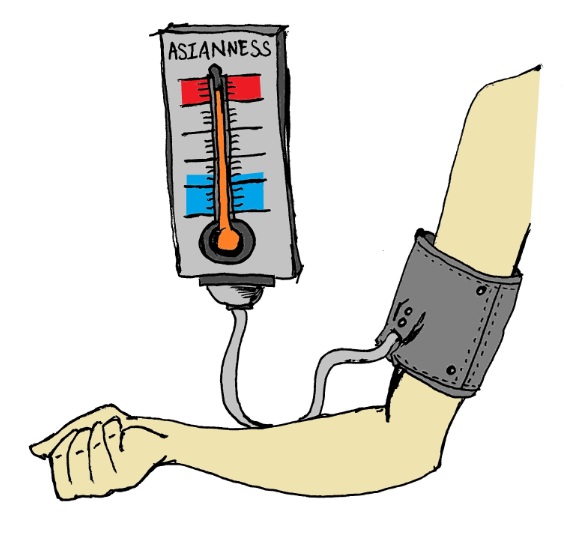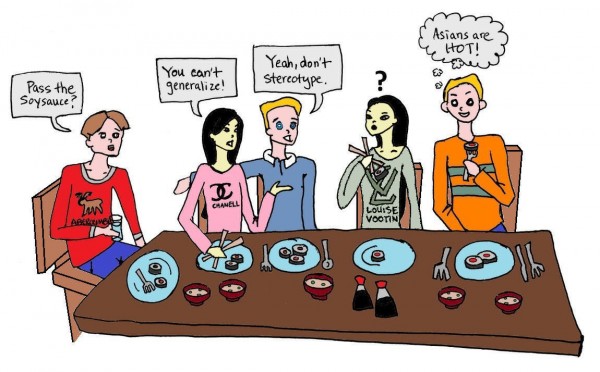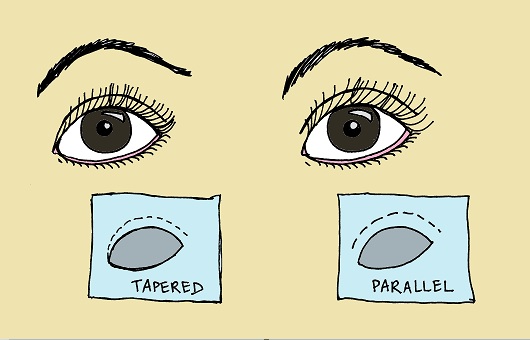 As it turns out, one’s intensity of Asianness is measurable. You can be “not Asian enough” or “so Asian” and such quantifications will have nothing to do with the ethnic identification of your parents. What’s more, there are even assigned values to Asianness, because apparently no one wants to be seen as “so Asian.”
As it turns out, one’s intensity of Asianness is measurable. You can be “not Asian enough” or “so Asian” and such quantifications will have nothing to do with the ethnic identification of your parents. What’s more, there are even assigned values to Asianness, because apparently no one wants to be seen as “so Asian.”
The other night I was at a dinner function of white folks and two lone Asians–another female and me. [Tangent: And why is it whenever there are two lone Asian females in a group, the relationship will go one of two ways? Either the two immediately become BFFs or the two look at each other uneasily as if one is a threat to the other (“No, bitch, I’m the token Asian tonight”)]. Anyhoo, I’m at this function with the one other Asian female. At a point in the conversation, my fellow Asian sister said something that I thought sounded very typical Asian, in a good way, too, mind you, so I gleefully exclaimed, “That’s so Asian!”
Rather than laugh in acknowledgment, she looked horrified. She glanced quickly at the white people seated around us. Oh no! What do they think now? She narrowed her eyes and glared at me with a “How could you!?” expression, like I had just aired her dirty laundry in public. Honey, I wanted to say to her, They already see that you’re Asian.
Even as grown women and men far removed from playground tauntings (“Go back to China, you Koreanese Chinaman Jap. Ching Chong.”), we APAs are still uncomfortable when people call attention to our Asianness. We’re secretly thrilled to be called white-washed because it somehow indicates we’re less Asian. We ridicule Asian characters called Chang Bang Wang and want to see more Asian characters named Bob, even though the reality is there are more Asian people called Chang Bang Wang than Bob. And most profoundly of all, we waste away decades of our lives struggling with identity issues (or summarily ignoring them a la the ostrich mentality).
What that Asian female at the dinner function ended up retorting to my “That’s so Asian” exclamation was some “Tsk! Tsk! Let’s not be racist” response. She said loud enough for everyone at our table to hear, “That’s not Asian or non-Asian. It’s just how one particular individual happened to behave. You can’t generalize.” And– not that it should be relevant, but her boyfriend, a rather effeminate looking white guy, sat to her side. “This is true,” he joined in. “Can’t stereotype.”

Oh brother. Inside I was totally rolling my eyes. Please, not that politically correct bullshit. Can’t generalize that most Asians don’t say “I love you” to their loved ones? That we play the piano or violin because our parents think that’s the key to getting into Harvard or Yale? That we’ll waste gas money to drive three hours to save twenty bucks on a gadget that happens to be on sale in the next city over? Can’t jump to the assumption that if a souped up Honda Civic pulls up on the road it’s not going to be an Asian dude with over-gelled hair in the driver seat? These are all instances of how some particular individuals (lots of them) “happen” to behave?
Stereotypes come about when humans detect patterns, when we perceive an unusual proportion of a certain group to categorically behave a certain way. The silly creatures that we are, we assume this means that all of the members of that group behave that certain way. The more stereotypes you fit, the more rooted into that group you must be. Being stereotyped as “so Asian” means you are the “other” and therefore do not belong. At the heart of things, that’s why we APAs bristle when someone describes us as “so Asian.” Because not only are we stripped of our individuality, but to add insult to injury, we’re being lumped into an outsider/inferior group of “others.” [Case in point, when we’re called “so white,” rather than bristle, we give a loud sigh and feign reluctance in our admission, “Yeah–I guess I am,” then smile secretly to ourselves. Success!]
The “so Asian” comment was uncomfortable to that fellow Asian because she didn’t want to be grouped in with a bunch of other Asians. Being so Asian as opposed to just Asian somehow added a sense of doomsday inescapability to it all. It was borderline “fobby,” and we all know that fobby is the penultimate form of being “so Asian.”
That Asian sister’s reaction got me thinking about the other ways we freak out about our Asianness. Asian women especially seem to shirk at any reference to how we look as being “so Asian.” We hate looking Asian so much that all of our makeup techniques are geared toward concealing our Asian-y features rather than enhancing them. Makeup for the mainstream is usually about enhancing the current features we have and concealing problem spots like pimples, discolorations, dark under eye circles, things like that. Not Asian women. We use makeup to conceal how Asian-y our natural features look.
Makeup should be about enhancement, but Asian women wear their makeup and Asian fashion guides teach women to wear their makeup in a way to make them look more white. Our flaws, then, are not merely pimples and dark under eye circles, but we perceive our flaws to be any feature that make us look “too Asian” (monolids, flat noses, round faces, oh and even black hair or dark eyes; nowadays everyone is dying their hair blonde or light brown and popping in blue and green contacts).

I was reading about how some Asians who have a double fold (stupidly prized among Asians) will still use makeup products to change the double fold from tapered to parallel. Have I lost you? Yes, I was lost too.
So typically, Asians with a double fold have tapered folds, which give them an almond shaped eye. Tapered folds merge into the inner corners of the eye. Caucasians, however, have parallel folds, which give them a rounder shaped eye. Parallel folds don’t merge into the inner corners the way tapered folds do. Many Asian women pine for that rounder shaped eye, and so alter their tapered folds to look parallel. Dang. The issue doesn’t just stop at monolids versus epicanthic folds?!
Here is a makeup tutorial on how to make your Asian eyes appear more round and Caucasian:
I am in no way showing any contempt for XiaXue, by the way. I adore her blog, her videos, and public persona, and am a shameless fan of hers. But that above video was an eye opener for me. Pun…
Here is another transformative video, a clip taken from a Taiwanese TV show:
Around 7:48, the hosts remark about the girl putting on makeup, “She looks Caucasian now!” and they proceed to ooh and ahh how beautiful she is now that she’s done up her eyes to hide the chink.
There’s plenty more where that video came from. See here where they pretty much mock monolids, or here where the girls reveal their un-made-up faces for the first time to their boyfriends, or my favorite of them all, here, covering MILFs. In all of these videos, the participants look fine to me before the makeup, except their features are distinctly Asian. The hosts remark ad nauseum, “Ew, she has monolids” or “Ew, her eyes are so small,” and “Ew, look how flat and big her nose is.” It’s clear to anyone that these women are extremely uncomfortable in their own skin. Just look at their demeanor when they need to show their natural faces to the public, and how that demeanor changes once they’ve got their makeup on.
It’s not so much that they literally look more white with makeup on. I’m sure that isn’t the conscious point of things. It’s a latent defect. In Asia, women are fed Westernized conceptions of beauty and as a result, anything Eastern is seen as ugly, unpopular, uncool. You think being “so Asian” in America triggers public condescension? Being “so Asian” in Asia triggers a far fiercer disdain. This isn’t a place for me to get into post-colonialist cultural anthropology and the systemic feelings of inferiority of the colonized, but yeah muse in that direction.
And before you think Asian men are excepted from all this, my Hubby has an interesting mannerism as well. Hubby loooooves his Asian pop. He will listen to it on full blast in the car until I go batshit crazy and want to unplug his music player and toss it out the window. Fortunately I discovered a less expensive way to get him to turn it off. Bring a white person on board. Whenever one of our white friends enters our car, Hubby will quickly switch his A-pop to NPR. He doesn’t do this when one of his Asian friends rides with us. In fact, when an Asian friend joins us, he turns up the volume on 2NE1 and the two bop their heads to the rhythm in sync. I don’t get the double standard. I mean, I get it, but I also don’t. How insecure are we as a whole community that we feel the need to downplay our Asianness when whites are watching?
Being afraid of our Asianness also extends into our professional lives. Recently the topic of being APA in the legal profession came up between a fellow APA colleague and me. He was telling me about how he steered clear from Asian-interest associations and homogenous gatherings of Asian lawyers because that’s “not how he wanted to be seen professionally.” In law school he avoided APALSA (Asian Pacific American Law Students Association) like the plaque and when he became a lawyer, joined the county bar association rather than the Asian American one. He expressed how offended he got when his firm assigned him Asian clients, figuring the two could chat together in their own language. “Why would I be any better with an Asian client than the next lawyer over? Just because we’re both Asian?” Uh…yeah? Sure it’s just an assumption, but it’s a fair one to make. “Well as it is, I am utterly uncomfortable in all-Asian situations,” he said.
That was when I fretted a little. Uh-oh. Perhaps he didn’t realize my Asianness. Perhaps that day I did up my makeup too well or something. Or perhaps he doesn’t realize he’s Asian. Shit.
We fear being cast as “so Asian” because there already is this preexisting notion of APAs as perpetual foreigners. That makes us hypersensitive to any shout-outs to our Asianness, especially shout-outs made in front of the white mainstream. Had I said to that Asian sister in the same tone with the same smile on my face, “That’s so white-washed!” she would have sighed, pretended to hang her head, and replied, “I know. Isn’t it terrible?”








